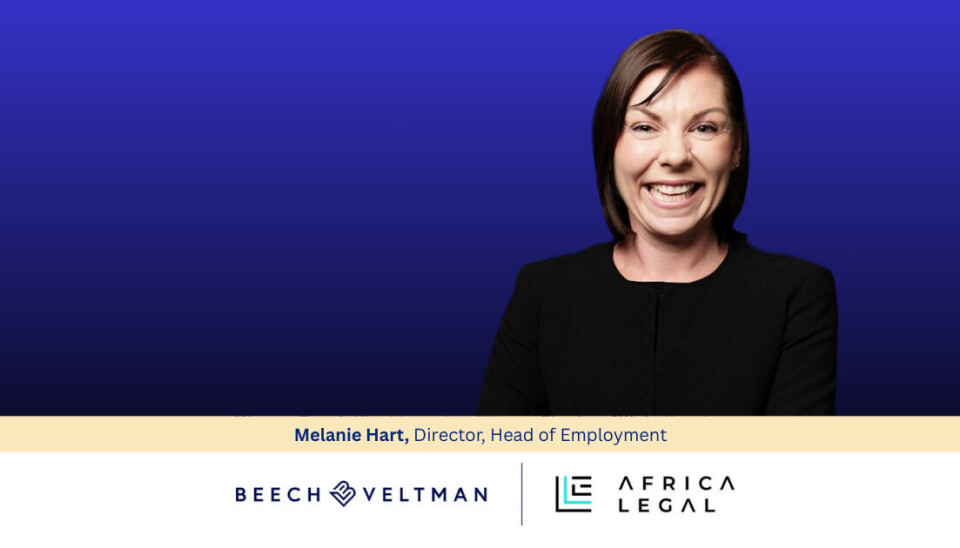Copyright : Re-publication of this article is authorised only in the following circumstances; the writer and Africa Legal are both recognised as the author and the website address www.africa-legal.com and original article link are back linked. Re-publication without both must be preauthorised by contacting editor@africa-legal.com
Women’s Month: Working to create better, safer, fairer workplaces

Globally renowned as a leading employment law practitioner, Beech Veltman Director Melanie Hart shares some of her thoughts and expertise while exploring key trends and topics.
Staying abreast of legislative changes and case law which impacts employment practices is crucial for employers in order to maintain compliance, mitigate risks, and foster a positive workplace environment, says employment law expert Melanie Hart.
Melanie is a Director and Head of Employment at Beech Veltman Inc, a leading mining, natural resources and energy focused law firm. She is globally renowned as one of the region’s top employment and labour lawyers; in the past year or so alone Melanie has been ranked as a Leading Partner by Legal 500, highlighted by Best Lawyers for her outstanding expertise, and recognised in the global edition of Lexology Index’s Who's Who Legal as one of the world's leading practitioners.
Speaking to Africa Legal ahead of Women’s Month in South Africa, Melanie says young African women entering the legal profession should be aware that although society and business have evolved over the years and decades, they will likely still be questioned more, judged faster, and underestimated quicker.
“However, there is a unique and sophisticated power in one’s femininity,” she says, noting women can navigate high-pressure environments and build their confidence as lawyers in their own ways. “You don’t need to emulate your male colleagues to get ahead. Conduct your practice boldly, elegantly and powerfully.”
Those wanting to specialise in employment law should focus on staying updated with current trends, and gaining a deep understanding of the field, developing various skills and experience through a variety of cases, and building networks.
On 26 June, Melanie was one of the region’s top legal minds brought together for the Labour Law News Conference 2025, speaking on a Panel of Experts during a powerful day of insights and engaging conversations on topical issues in the field.
“There are a number of proposed amendments in the pipeline,” shares Melanie, pointing to an example under the Labour Relations Act for remedies available to high-earning employees. “In terms of this amendment, reinstatement will only be granted in instances of automatically unfair dismissals. In the case of other types of unfair dismissal, the remedy will be restricted to capped compensation.”
There is a shift away from overly technical and formal disciplinary procedures. “A fair dismissal process is clarified to providing an employee with a reasonable and adequate opportunity to respond to the reason for dismissal. This amendment aligns with the recently released new draft Code of Good Practice on Dismissal.”
Other hot topics and growing workplace concerns include restraint of trade clauses, and misuse of medical certificates. In relation to the first, Melanie tells Africa Legal that while every employee owes a duty of confidentiality to their employer, not every employee should be required to sign a restraint of trade.
“It is crucial that there be a proprietary interest worthy of protection, for example. the employee has entrenched customer connections, specialised know-how, or was privy to proprietary information that would be valuable in the hands of a competitor. A one-size-fits-all restraint also serves no purpose. The restraint activities should be moulded to fit the particular protectable interest being addressed.”
Melanie is a persuasive and successful litigator who has been praised by clients and international legal directories for providing clear and practical guidance and strategic advice across a broad spectrum of employment issues.
As South Africa observes Women’s Month and National Women’s Day on 9 August, honouring the 1956 march of approximately 20,000 women who protested against oppressive pass laws, and celebrating the important contributions women make to society, Melanie Hart is an example for young African women of harnessing the legal profession to make a difference, and rise to the top of their chosen fields.
